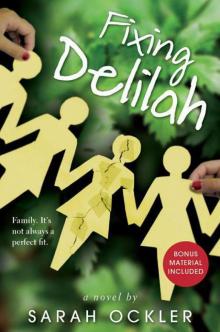- Home
- Sarah Ockler
Fixing Delilah Page 4
Fixing Delilah Read online
Page 4
“I can’t believe… I can’t believe you’re here, like right here,” I say. “I was just thinking about when we used to come down here to look for stuff after the races.”
“Me, too.” He unearths a layer of dirt with his sneaker, still smiling beneath his cap.
“I haven’t seen you in eight years.”
Little-Ricky-now-Patrick nods and pulls his Catcher book against his chest. “Delilah Hannaford, you nearly broke my heart when you didn’t come back that summer.” He winks at me.
“I was eight,” I say, following him as he walks out toward the docks. “I didn’t get a vote.”
“I know. That’s why I’ve decided to forgive you. Well that, and you’re still kind of adorable.”
“Kind of?”
Patrick laughs and puts his arm around me, pulling me close in his old magnets-on-the-fridge way. “Hey, seriously, Delilah. I’m sorry about Nana. I was home when Dad… I mean, he called me over there and told me what happened.”
“How did he know she was… you know. Gone?” I keep my eyes down as we speak, one foot moving slowly in front of the other along the planks that make a wide path around this end of the lake.
“We were helping her remodel the sunroom in the back. When she didn’t answer the door yesterday, he went in, and that’s when he found her.”
I consider this as I recall the old sunroom, big bay windows looking out over the lake, all the sunlight shining through them nearly absorbed by the heavy wood panels covering each wall. I think about the matriarch of my family taking her final steps and final breaths, feeling again like I’m watching some fictional cop show with the tough-but-emotionally-wounded police escort giving details on the crime scene.
“Emergency response took her to Maple Valley so the doctor could confirm the cause of death,” Patrick says. “He said it was her heart. He asked us if we knew how to reach her next of kin, so Dad gave him the number he still had for your mom, but it was an old one. They tried Rachel next. You know the rest.”
“I’m not sad, really.” The confession falls out fast, but Patrick’s eyes don’t falter as I rush to explain. “I mean, the whole thing is sad, but it hasn’t really hit me. There’s so much… I haven’t been back since my grandfather’s funeral. I don’t remember them very well, you know?”
He nods. “That was the last time I saw you. You were wearing a light blue dress and you were just…” Patrick looks out over the lake, searching. “Inconsolable,” he says. “You asked me to find you four-leaf clovers for his grave.”
Clovers. I don’t remember the light blue dress, but the clovers—of course. It’s as if I was here last week, combing through the grass while Papa watched me from his wheelchair. Look, Papa! A six-leaf clover! I’d made it by tearing three leaves down the middle because I’d already found so many four-leafers that I was afraid I’d use up all the good luck in Red Falls. My grandfather kissed the top of my head and called me his lucky little rabbit’s foot. It was like that every summer at the lake house—me. Papa. Little Ricky. The four-leaf clovers. I thought they’d last forever.
I lean on the rail over the water, watching the sun spark off the surface. A family walks behind us, the youngest of three kids riding his dad’s shoulders and pointing at the sailboats in the distance. “Boap! Boap! Boap!”
“More tourists than I remember,” I say.
“Yeah. They’ve really jacked this place up. Dad and I worked on some of that new construction over there.” Patrick points across the lake to a row of gray and white cottage-style homes on a spot that used to be no more than a thicket of trees with a small dirt path leading into the woods. “They stopped the boat races because the motors were disturbing the out-of-towner fishermen and the sailboats. They said it was preventing an ‘authentic New England experience.’ ”
I laugh. “Whose idea of authentic?”
“Exactly. It’s not completely overrun, though. Besides, once the boat races stopped, the turtles showed up.” He points toward the edge of the lake where two turtles bask on a large, smooth rock, their heads craning toward the sun. Behind them, a smaller turtle scrabbles up the side, slipping back into the water with a sploosh. Just as quickly as she fell, her head and feet poke through the surface of the lake for another try.
“I saw some new places on Main Street,” I tell Patrick as the turtle finally summits the rock. “Trendy camping store. Nail salon. Coffee place.”
“Luna’s,” he says. “The coffee place. I do shows there all summer.”
“Shows? Like, ‘To be, or not to be’ stuff?”
“Um, no.” He shoves me on the shoulder as we continue our walk, his deep smile showing off his dimples. Oh no. I remember those.
“I sing and play guitar,” he says. “Acoustic.”
“Seriously? You sing?”
He nods, taking off his hat to run a hand through his sticking-out-everywhere summer hair. “You should check it out next week. We usually get a pretty good crowd. I do a mix of originals and covers—people like to sing along, you know?”
“Patrick, that’s so awesome.”
“Oh, man, wait till I tell Emily about you!”
“Emily?” My chest tightens. “Is that your girlfriend?”
“No, nothing like that. Just a good friend. She works at the café. Luna is her aunt, actually. She’s always at the gigs, either working or just hanging out. You’ll see. You’ll like her.”
“Sounds cool.”
“Next show is next week, Tuesday,” he says. “Think you can make it?”
“Definitely.” I skip the whole irrelevant part about my current state of semi–house arrest. Not to mention the part about my non-boyfriend, also irrelevant.
Our walk stretches on for nearly two hours, all the missing years smushed back together. As we near the bleachers again, Patrick buys popcorn from a vendor along the path and we take turns throwing it in the water, watching the seagulls bob on the waves and dive after the little white kernels.
“I still can’t believe you’re here,” he says when the popcorn’s gone. His eyes hold mine longer this time, and I let myself get a little bit lost in the honey color they take on in the low sun. When he smiles again and squeezes my shoulder, something swirls in my chest. I can’t temper it, and it unhinges me a little. So I pull away from his touch and tie my humidity-prone hair into a loose ponytail, mortified to imagine how frizzy it must be but grateful for the distraction. “I should get back, Ri—I mean, Patrick.”
“Sure,” he says. “I’ll see you soon, anyway. My dad stopped over there earlier. I guess your mom wants to talk about the sunroom and other house projects over dinner tomorrow.”
“Dinner? You sure you want to come around?” I ask. “One house. Three women. Dead people. I can almost guarantee random, unprovoked cat fights and spontaneous bouts of crying.”
“Well, since you put it like that…” Patrick’s fingertips brush my bare arm so lightly the hairs on my skin have to stand up and stretch to reach him.
“See you then,” he says. He flashes his dimpled smile once more and heads back to his spot on the bleachers, Catcher in hand. As I walk up the hill to my grandmother’s house, my hand moves to my arm where the feel of his touch still lingers, warm and soft and familiar like my memories of Little Ricky racing around the lake, devising contests to dig up the biggest fish bones or jump off the highest dock.
You’re still kind of adorable.
That thing in my chest lurches sideways and I take a deep breath, count to ten, and bury it, way down deep.
Chapter seven
It’s silent back at the lake house.
The groceries have been put away and Mom’s card table desk is tidy—pen-filled coffee mugs threatening to evict the rooster-themed tissue box behind them. Everything is still. Lifeless.
No one is here.
Upstairs, all of the doors are open but one—the room at the end of the hall that my grandparents shared. Mom’s luggage is stacked in her old room; Aunt Rachel’s i
n hers—the Purple Room. I fell asleep in there once, the Purple Room. There was a monster under the bed, something scaly with huge yellow eyes and an appetite for small children. Mom was working in New York City that week, and I remember screaming for Nana, who was less skilled at scaring away monsters than my one-legged grandfather but could definitely get to my room faster. Nana was at my side flipping on the light after the first scream, but in her haste, she’d forgotten to put on her hair. Unbeknownst to me, she didn’t have her own—just a collection of wisps that hovered around her head in a cotton candy cloud. It took an hour for her and Papa to convince me that the banshee standing at the end of my bed was actually Nana, even after she got back into her wig. I’m not sure I ever really trusted my grandmother after that, even though I never again saw her without her hair (or slept in the Purple Room).
My bags are stacked in the bedroom I always had here in the summers. We never talked about it before, but as I drag my stuff across the floor toward the closet, I realize with a chill that this must’ve been Stephanie’s old room. I sit on the corner of the daybed—the same one from before, minus the white lace canopy—and wonder whether this was her actual bed. Her actual canopy that I slept beneath. Her actual toys and dolls that I played with. Then, thought converted to action without my awareness, I’m on my knees, crawling partway under the bed as if I might find a clue. A sign. A treasure map. The missing diary, somehow overlooked for all these years in this most obvious hiding place.
It’s bare, of course, the floor beneath the bed. Nothing more than dark brown slats of hardwood, blanketed with a fine dust, marred only in the corners by the occasional movement of the bed and a single, deep carving near the left front post:
SH + CC
SH. Stephanie Hannaford. CC must be the boyfriend Rachel mentioned. I run my fingers over the grooves in the wood and wonder what she was feeling that night. How long ago she carved it. Whether she wanted it to be seen. When I finally pull myself out from under the bed, the air is cold and I rub my arms. What else have you left for the living to find?
Whether they once belonged to Stephanie or not, the dolls that lined the shelves in this room when I was a child are gone, replaced now with jars of buttons and boxes overflowing with ribbons and zippers and swatches of loose fabric. I don’t remember my grandmother sewing, but there’s a Singer nestled under a landslide of tissue-paper patterns, turquoise fabric caught mid-stitch, spilling over the table like a waterfall. This is the room I always had, but everything is different now. Everything changes in the space of eight years—faces, places, even memories—realities as different from our recollections as we are from our old selves.
The closet is jammed with winter coats and boots and dry cleaning bags of laundered dress clothes, but most of my stuff fits into an empty dresser. On the top there’s an old mason jar of colored, unmatched buttons that rattles when I open and close the drawers: shiny, glass-hard bits of rainbow like the sweet-and-sour candy we used to buy at Crasner’s. The bed looks just-made, and across from it there’s a small table and chair beneath a window where I can sit and lean on my elbows and stare out at the seagulls gliding down to the lake.
Or, from the window over the bed, at Patrick’s house. Lifting the shade, I see his old bedroom window from here, just like before. I wonder if he’s up there now, reading the rest of Catcher in the Rye—maybe the part where Holden talks about the books Phoebe writes but never finishes, or when he calls a prostitute to his hotel room, or…
“Delilah?” Mom knocks softly on the doorway, entering without permission and taking a seat on the daybed. I open my mouth to order her out, but the part of me that wants to fight is outvoted by the part that remembers her in the yard a few hours ago, yanking out the grass.
“Hey,” I say. “Where were you guys?”
“We took a walk into town to meet Bob Shane, the funeral director, to discuss the plans. Apparently Mom made the arrangements years ago, just in case no one was around to carry them out.”
I join her on the bed, not sitting too close. “When are we having the funeral?”
“I was hoping to take care of it as soon as possible so we could focus the rest of our time on the house, but that’s not going to happen. She wanted to be cremated, which Bob can do this week, and buried in the plot next to Dad. But she also wanted some of her ashes scattered over the lake. Since Red Falls is so popular in the summers now, outdoor ceremonies require a special permit so they can rope off part of the lake for the scattering.”
“Sounds complicated,” I say.
“Between that and the actual service plans, realistically, we’re looking at the end of summer.”
“And don’t forget about this guy,” Aunt Rachel says, showing up in the doorway with an economy-size mayonnaise jar. “He was in the hall closet, just like Bob said.”
Mom shakes her head. “I really hoped he was joking.”
“Nope. Man, for a jar of ashes, this thing weighs a ton. Must’ve been a big dog.”
I jump up from the bed, backing away toward the closet. “A dog? A dead dog is in there?”
“Little Ollie,” Rachel says, setting him on the floor at her feet. “Her Saint Bernard. He died last year and she had him cremated by the vet. Bob told us that Mom wanted them buried together. It’s against the rules, but he promised her he’d mix their ashes anyway. I have to run these over tomorrow.”
“This family is insane,” I say, flopping back on the bed. “I can’t believe I’m stuck here for the entire summer.”
Mom looks at my hands, but she doesn’t reach for them. “Delilah, I know this isn’t how you planned to spend your summer. None of us expected to be here, and it’s going to take time to get used to these… arrangements. We’ve got just about two months to get this house in shape, organize an estate sale, and plan the funeral service. Plus, between Realtors anxious to secure the listing and people offering their condolences, I expect we’ll be inundated with visitors over the next few days. It’s going to be a zoo. We’ve got to stay on track and remember why we’re here.”
I look at my mother and her sister and the flowers embroidered on the bedspread and wonder whose version of why we’re here she’s referring to. Are we here to delve into the past? To talk about what happened at Papa’s funeral eight years ago? To remember Stephanie? To say good-bye? Or are we just here to sell the house, get back to Key, and forget about Red Falls all over again?
“I understand being back here is tough on you,” she continues. “It’s tough on all of us. But I don’t want you wandering off again like you did this afternoon. Considering your issues with following rules, you need to stick close to the house with me or Rachel unless I say otherwise.”
I’m ready to make a case for myself, but Mom launches quickly into a monologue about my recent behavior, throwing in a few of her favorite miscreant catchphrases like acting out, attention-seeking, impacting your future, and not without consequences. I hear all the words, but only peripherally, like watching the sailboats today on Red Falls Lake—in front of me but distant, their speed and imbalance warped into something slow and graceful by the curvature of the Earth.
“Did you hear me, Del?”
I shrug.
“I spoke with Mr. Marshall at Kennedy the other day, and he—”
“What?” I ask. “You talked to the guidance counselor about me?”
“It’s no secret that you barely passed this year. You’ve cut classes. Missed assignments. Shown up late. We’re concerned you might not have a successful senior year.”
I wrap and unwrap a loose thread from my shorts around my finger, watching the tip turn purple and white, purple and white. She just lost her mother, Delilah. Let it go. Purple. White. Purple. White.
“He also said that you skipped all the big pep rallies this year. The dances. That you ate lunch in the library alone a lot. What about your blogger friends? I thought you loved those girls. What happened?”
What happened? I’ll her exactly what happened—a
ll of it. How my so-called blogger friends are more concerned about scoring booze for the next creek party than they are about reporting the issues and spending time together. How ever since Libby Dunbar inherited the junior class blog, it’s taken on its own demonic life, morphing from a cool and somewhat helpful academic resource to a gossip ’zine almost overnight. How the trendy new format launched Libby into pseudo-celebrity status where freshman girls clamor to carry her books and clean up her lunch tray. How the blog’s most popular feature, “Kiss or Diss,” invites people to publicly rate the looks of classmates. How the “Rumor Mill” message board publishes more atrocious lies than the stuff in the grocery store tabloids. And how last month on the “Free-4-All Graffiti Wall” someone anonymously uploaded cell phone pictures of me and Finn kissing behind the skate park, one of his hands up my shirt, the other on my ass. How every morning after that, I’d show up at my locker to find another printout of that awful pose taped at the top, guys calling out across the hall in front of the whole world, “When’s my turn, Hannaford? Do I have to buy tickets or is the feel-up service complimentary?”
When I asked Libby to remove the photos, she told me I was overreacting, that the pictures weren’t even that bad. She laughed and said that her blog would make me almost as famous as it made her. Then, after I e-mailed a final plea, she wrote back one last time, saying only this:
“Delilah, I’m not censoring anyone. I really thought you of all people would know how important freedom of the press is. Your father died defending it.”
When I open my mouth to confess the whole sordid tale, the only words that fall out are, “Things are just different this year, Mom.”
“Yes,” she says. “Things change sometimes, and not always in the way we’d like them to. I understand that. But the whole situation speaks to the larger issue of your behavior, and frankly—”
I hold up my hand. “I don’t want to talk about it.”

 Bittersweet
Bittersweet The Summer of Chasing Mermaids
The Summer of Chasing Mermaids #Scandal
#Scandal Twenty Boy Summer
Twenty Boy Summer Fixing Delilah
Fixing Delilah